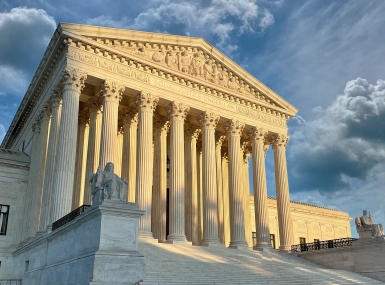Supreme Court Update: City of Grants Pass v. Gloria Johnson
Author
Upcoming Events
Related News

Supreme Court Update: City of Grants Pass v. Gloria Johnson
COUNTY NEXUS
As communities across the country address the complex and nuanced issues of housing shortages and homelessness crises, it is critical for localities to retain the ability to make tough policy choices unobstructed by court-issued mandates.
BACKGROUND
Over the last few years, courts have significantly narrowed the permissible scope of local regulation of public camping. The catalyst for this shift was Martin v. City of Boise, a 2018 Ninth Circuit Court of Appeals decision that prohibits encampment ordinances when applied to homeless or unsheltered individuals when a local government lacks adequate emergency public shelter beds. However, the court left open the question of whether any regulation of the location or scope of public camping can be constitutional. In a subsequent case, the Ninth Circuit Court of Appeals ruled against the constitutionality of an anti-encampment ordinance in Grants Pass, Oregon in a decision that appeared to expand Martin, citing the Eighth Amendment's prohibition against cruel and unusual punishment. The Supreme Court granted review of that decision at the urging of numerous state and local governments and representative associations, including NACo.
NACo ADVOCACY
In a Local Government Legal Center Amicus Brief submitted in support of the petitioner, NACo argued that if a ruling for the respondent would divert complex, highly localized policy decisions about how to respond to homelessness from the county legislature to the federal courts, with substantial financial implications for local governments and perverse incentives to invest public resources on temporary shelter beds rather than more permanent solutions.
CURRENT STATUS
On June 28, the Supreme Court issued a 6-3 ruling that anti-encampment ordinances do not violate the Eight Amendment, overturning both the decisions in Martin and in Grants Pass. The majority opinion, which cites the Local Government Legal Center's brief on numerous occasion, will provide the critical flexibility needed for county governments to respond to homelessness in their communities. Learn more here.
2024-2025 Supreme Court Term

NACo Legal Advocacy: Ames v. Ohio Department of Youth Services
As one of the largest employers in the country, counties have a significant interest in cases like Ames v. Ohio Department of Youth Services (Ames v. Ohio) that could expand county liabilities as employers.

NACo Legal Advocacy: City of Buffalo et al. v. Kia/Hyundai
The question at hand in City of Seattle et al. v. Kia/Hyundai is whether or not the Federal Motor Vehicle Safety Standard preempts state tort claims brought forth by local governments alleging that Kia and Hyundai’s failure to install “reasonable” anti-theft technology constitutes negligence and public nuisance.

NACo Legal Advocacy: Perttu v. Richards
Perttu v. Richards has implications on the Prison Litigation Reform Act (PLRA) and could increase the amount of Section 1983 inmate-initiated cases against county jails that reach federal court, ultimately resulting in counties having to expend resources on frivolous lawsuits.

NACo Legal Advocacy: McLaughlin Chiropractic Associates, Inc. V. McKesson Corporation
McLaughlin Chiropractic Associates, Inc. V. McKesson Corporation could make it more difficult for counties to challenge FCC orders, many of which have taken steps to preempt and curtail local authority by limiting counties’ abilities to manage their own right of way and assess fair market value permitting and impact fees on providers seeking to construct, modify or extend telecommunications infrastructure in their communities.

NACo Legal Advocacy: San Francisco v. Environmental Protection Agency (EPA)
San Francisco v. Environmental Protection Agency (EPA) has implications for the ability of county governments that own and operate wastewater treatment facilities to comply with National Pollutant Discharge Elimination System (NPDES) permit requirements.

NACo Legal Advocacy: Lackey v. Stinnie
Lackey v. Stinnie will impact the ability of state and local governments to avoid paying litigation fees in a civil rights case if they change their conduct (i.e. repeal a law) after a court has granted a preliminary injunction.

NACo Legal Advocacy: Bondi v. VanDerStok
Garland v. VanDerStok has implications for the ability of county law enforcement to uphold public safety and investigate crimes involving ghost guns.

NACo Legal Advocacy: Stanley v. City of Sanford
Stanley v. City of Sanford will impact the ability of county governments to balance budgets by reducing or eliminating post-employment benefits for disability retirees.

NACo Legal Advocacy: EMD Sales, Inc. v. Carrera
EMD Sales, Inc. v. Carrera could make it more difficult for county governments to prove exemptions under the Fair Labor Standards Act (FLSA), which would increase the potential for costly litigation.

NACo Legal Advocacy: Federal Communications Commission, et al v. Consumers' Research, et al
Federal Communications Commission, et al v. Consumers’ Research, et al. (FCC v. Consumers’ Research) could jeopardize what is known as the Universal Service Fund (USF). Through the USF, the FCC has provided billions of dollars to local governments and our residents, helping provide essential telecommunications and broadband services to unserved and underserved communities. FCC v. Consumers’ Research challenges the FCC’s legal authority behind the USF, putting multiple programs essential to equitable broadband deployment at risk.
Featured Initiative
Supreme Court Advocacy Hub

Advocacy
U.S. Supreme Court protects key flexibility for county governments responding to homelessness
On June 28, the U.S. Supreme Court issued a 6-3 ruling in Grants Pass v. Johnson, a case of major significance for counties working to develop comprehensive responses to the homelessness crisis.

